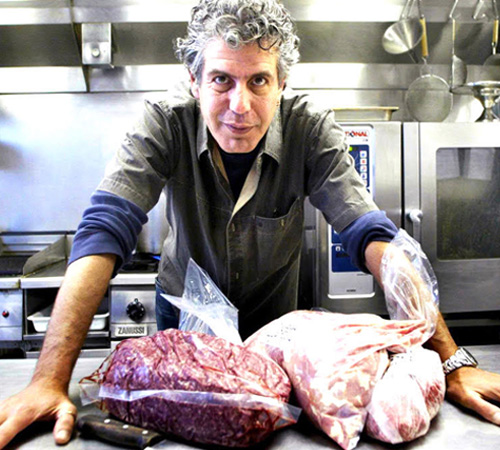Unblinking –
June 9, 2018 – “In America, the professional kitchen is the last refuge of the misfit,” Anthony Bourdain once wrote. “Admittedly, it’s a life that grinds you down,” he added. “Most of us who live and operate in the culinary underworld are in some fundamental way dysfunctional.” That declaration served as an in-your-face summation of Bourdain’s 1999 New Yorker piece that did much more than launch his celebrity career. It dragged the stresses and mental health rigors of working in the restaurant industry into the open, both for those people seated at the front of the house and, more importantly, for those unseen, toiling in the back.
Bourdain kept that conversation up as he traveled the world digging in to whatever food the locals would put in front of him. Baked into his conversations with top chefs and street cooks was his ownership of his former experiences with drug addiction and times when, well, he just felt like shit. For restaurant workers, it all finally became OK to talk about. And now, with his suicide in a French hotel on Friday, the conversations that he started will continue, just without him.
“The more vocal people are, the better,” Mickey Bakst, the general manager of Charleston Grill in South Carolina and the cofounder of Ben’s Friends, a support group for recovering addicts in the food and beverage industries, said of Bourdain. “Many people need to see that there are others who can be successful, still be part of the industry, and be sober. It’s an important thing for people in our industry to know.”
Bakst, 66, has been in the food industry for 45 years and has been sober for 35.
“Here’s what we all know: Alcoholism and drug addiction are here to stay,” said Bakst, who shared mutual friends with Bourdain, including celebrity chef Eric Ripert, who found him dead in his hotel room Friday morning. “They’re not going anywhere, and the only way that we can start addressing this is a more open, regular discussion of it,” he told BuzzFeed News. “That’s what Anthony Bourdain helped do.”
Bourdain’s New Yorker piece sucked the reader in with headline-grabbing tips for diners about what not to order (i.e. the fish on Mondays). It established him as the rebellious truth-teller people came to know. But the piece was dark at its core, and he used it to shine a light on the dark, ugly side of kitchen culture. “Gastronomy is the science of pain,” he wrote at the time, when he was the head chef at Manhattan’s Brasserie Les Halles. Many cooks, he argued, were social outsiders, working odd hours in high-pressure environments.
The article earned him a book deal (his 2000 memoir, Kitchen Confidential: Adventures in the Culinary Underbelly, was a New York Times best-seller) and helped launch a media career that saw him host TV shows like Food Network’s A Cook’s Tour, Travel Channel’s No Reservations, and CNN’s Parts Unknown. It was through these shows that Bourdain helped reshape how TV presents chefs, taking viewers beyond the restaurant’s back walls to see the sweat and the tears. “It takes a certain type of lunatic to crave that kind of life,” Bourdain told the Toronto Star in 2000 of working in kitchens, bemoaning what he said was “day after day of mind-numbing repetition.”



